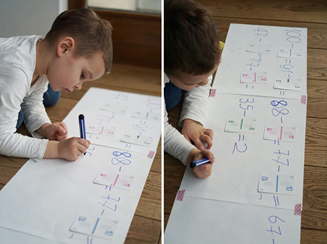In the school year 2018/2019 in our school there were extracurricular mathematical classes for eager pupils of grades 1-3.
The aim of these classes was to present each child various aspects of mathematics in a way that would allow him to study, discuss, try his strength, play and understand numbers, sizes, shapes and patterns.
Classes were conducted according to the following principles:
-
the problem is important,
-
everyone has the right to choose their own path to solve the problem,
-
we teach thinking, not tests,
-
there is no competition,
-
there are no tasks on time,
-
everyone is heard because the thought process counts.
Classes began with the task of a practical problem, to which the answer could be given by a mathematician. The problem was analyzed in the group, and the children themselves had to come to a solution.
Children discussing and learning from each other and following child's logic, it is easier for them to understand individual issues. The teacher did not teach them the subject according to the logic of an adult, but by moderating the group he was watching the correctness of the conclusions.
The lecturer also supported the mathematical record of the obtained solution, thanks to which the children learned this record and the way of expressing the solution to the problem. Record and mathematical operations, however, are not a goal, but a tool in solution.
Thanks to this approach, we educate thinking, independent identification of rules governing numbers and phenomena, thanks to which we broaden horizons and cause the absorption of natural mechanisms "I know how to think about it", "I know how to ask a question", etc.
Each child has innate mathematical abilities. He needs only the right stimulation by providing him with the necessary stimuli, so that his mathematical skills can develop and that the child feels confident and enjoys maths.
By the way, you can see that mathematics does not have to be boring, and its learning is not about recreating the learned patterns. The tasks being solved develop the skill of logical thinking, not the use of common patterns. They show that mathematics is interesting, smart, addictive and necessary.

